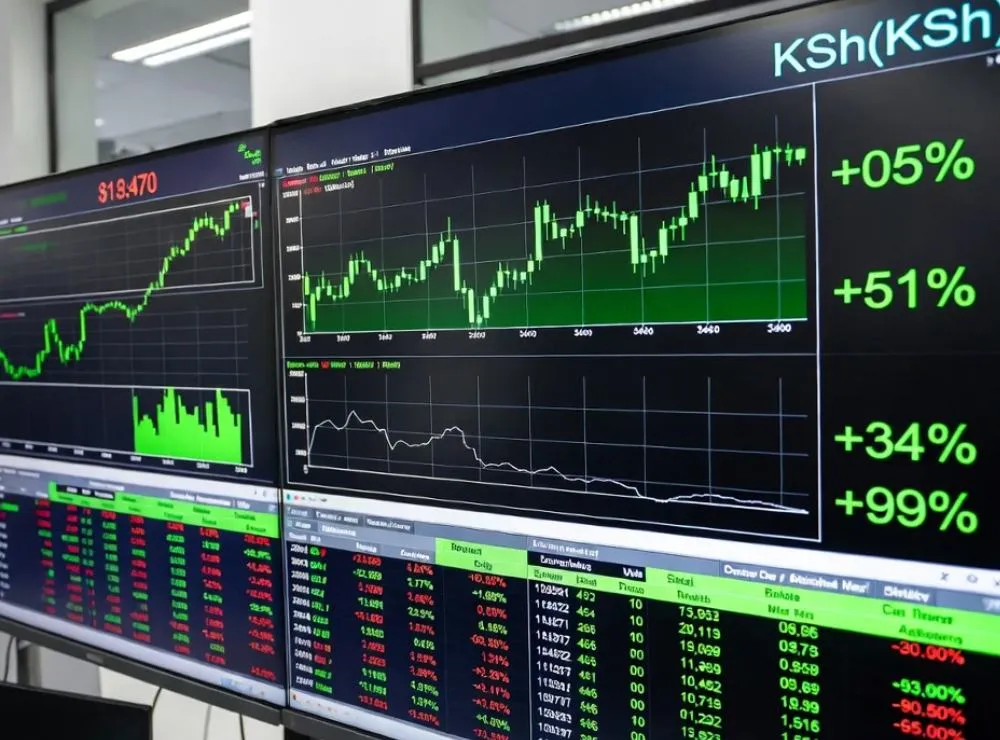In a groundbreaking shift in the cryptocurrency investment landscape, BlackRock, the world’s largest asset manager, has officially overtaken Grayscale Investments as the leading manager of cryptocurrency exchange-traded funds (ETFs). With its spot bitcoin (IBIT) and ether (ETHA) ETFs, BlackRock now holds an impressive $21.22 billion in assets under management (AUM), surpassing Grayscale’s combined $21.20 billion held across its various crypto trusts.
This milestone marks a significant moment not only for BlackRock but also for the broader acceptance and integration of cryptocurrency within traditional financial markets. The rise of BlackRock’s crypto ETFs signals a maturation of the digital asset space, indicating that institutional investors are increasingly confident in the long-term viability of these assets.
The Rise of BlackRock’s Crypto ETFs
BlackRock’s foray into cryptocurrency ETFs has been closely watched by industry observers. The firm’s success is largely attributed to its reputation as a financial titan, coupled with the growing demand for regulated, institutional-grade exposure to cryptocurrencies. The iShares Bitcoin Trust ETF (IBIT) and the iShares Ethereum Trust ETF (ETHA) have quickly become the go-to investment vehicles for institutions seeking to capitalize on the potential upside of bitcoin and ether.
Data from blockchain analytics firm Arkham reveals that BlackRock’s IBIT and ETHA ETFs now collectively manage $21.22 billion, outpacing Grayscale’s four flagship crypto products. These include the Grayscale Bitcoin Trust (GBTC), Grayscale Ethereum Trust (ETH), Grayscale Bitcoin Mini Trust (BTC), and Grayscale Ethereum Mini Trust (ETH), which together hold $21.20 billion in AUM.
Despite this shift, Grayscale remains a significant player in the crypto asset management space. Arkham noted that Grayscale continues to hold more crypto assets on-chain than BlackRock, primarily due to its Grayscale Digital Large Cap (GDLC) fund, which boasts around $460 million in AUM. The GDLC fund, unlike BlackRock’s ETFs, is not an exchange-traded fund but rather a diversified investment vehicle that holds a basket of large-cap cryptocurrencies.
Institutional Investors Flock to BlackRock
One of the most striking aspects of BlackRock’s dominance in the crypto ETF space is the level of institutional interest it has attracted. Major financial institutions like Morgan Stanley and Goldman Sachs have taken significant positions in BlackRock’s crypto funds, signaling a strong vote of confidence in the asset manager’s approach to digital assets.
Morgan Stanley, for example, disclosed ownership of 5.5 million shares in IBIT, valued at over $187 million. This position makes Morgan Stanley one of the top five holders of the fund, highlighting the bank’s growing interest in the cryptocurrency market. Goldman Sachs, another heavyweight in the financial sector, revealed that it holds $418 million in spot bitcoin ETFs, with $238.6 million of that sum invested in IBIT — the bank’s largest position in a single crypto ETF.
This trend of institutional investment is a critical development for the cryptocurrency market. Historically, the market has been dominated by retail investors, with institutional players remaining cautious due to regulatory uncertainty and the volatility of digital assets. However, the involvement of established financial institutions like Morgan Stanley and Goldman Sachs underscores a shift in perception. These institutions are not only recognizing the potential for high returns in the crypto market but are also seeking regulated and transparent investment vehicles to gain exposure.
The ETF Advantage: Liquidity, Transparency, and Regulation
The rise of BlackRock’s crypto ETFs can be attributed to several key advantages that ETFs offer over other forms of cryptocurrency investment. First and foremost is liquidity. Unlike traditional mutual funds or direct investment in cryptocurrencies, ETFs can be traded on exchanges just like stocks. This allows investors to buy and sell shares with ease, providing a level of flexibility and accessibility that is particularly appealing to institutional investors.
Transparency is another crucial factor. ETFs are required to disclose their holdings on a daily basis, offering investors a clear view of the assets backing their investment. This level of transparency is in stark contrast to some other investment vehicles in the crypto space, which may not offer the same level of visibility.
Regulation also plays a significant role in the appeal of crypto ETFs. As products that are traded on regulated exchanges, ETFs provide a level of oversight and investor protection that is often lacking in the broader cryptocurrency market. For institutions like Morgan Stanley and Goldman Sachs, which are subject to stringent regulatory requirements, the ability to invest in a regulated product is a key consideration.
Grayscale’s Response and Future Prospects
While BlackRock’s ascent in the crypto ETF space is noteworthy, Grayscale remains a formidable competitor. The firm has been a pioneer in the cryptocurrency investment industry, launching the first publicly traded bitcoin investment vehicle in 2013. Despite losing its lead in the ETF market, Grayscale continues to innovate and expand its product offerings.
Grayscale’s primary advantage lies in its long-standing reputation and its diversified product lineup. In addition to its flagship bitcoin and ethereum trusts, Grayscale offers investment vehicles that provide exposure to a wide range of digital assets, including those that are not yet available in ETF form. This includes the Grayscale DeFi Fund, which offers exposure to decentralized finance (DeFi) assets, and the Grayscale Smart Contract Platform Ex-Ethereum Fund, which focuses on blockchain platforms other than Ethereum.
Moreover, Grayscale is actively seeking to convert its existing trusts into ETFs. The firm has filed several applications with the U.S. Securities and Exchange Commission (SEC) to convert its bitcoin and ethereum trusts into spot ETFs, a move that could significantly enhance the liquidity and appeal of these products. However, the SEC has yet to approve any spot bitcoin ETFs, citing concerns about market manipulation and investor protection.
Grayscale’s continued focus on innovation and its efforts to secure regulatory approval for its products indicate that the firm is not willing to cede its position in the market without a fight. As the cryptocurrency market continues to evolve, it is likely that both BlackRock and Grayscale will play critical roles in shaping the future of digital asset investment.
The Broader Implications for the Cryptocurrency Market
The competition between BlackRock and Grayscale for dominance in the crypto ETF market has broader implications for the cryptocurrency industry as a whole. The success of these products reflects growing mainstream acceptance of digital assets and signals a shift in how these assets are perceived by traditional financial institutions.
For years, cryptocurrencies were viewed with skepticism by many in the financial industry, dismissed as speculative assets with little intrinsic value. However, the rise of regulated investment products like ETFs has helped to legitimize cryptocurrencies in the eyes of institutional investors. As more institutions allocate capital to crypto assets through vehicles like BlackRock’s IBIT and ETHA ETFs, it is likely that the market will see increased stability and maturity.
This trend is also likely to have an impact on the broader adoption of cryptocurrencies. As institutional investment in crypto assets grows, so too does the infrastructure supporting the market. This includes everything from custody solutions and trading platforms to regulatory frameworks and compliance standards. The involvement of major financial institutions is likely to drive further development in these areas, making it easier for other investors to enter the market.
Moreover, the success of crypto ETFs could pave the way for the introduction of new investment products. As the market matures, we may see the development of ETFs that provide exposure to other types of digital assets, such as stablecoins, DeFi tokens, or NFTs. This could further diversify the options available to investors and contribute to the growth of the cryptocurrency market as a whole.
Conclusion: A New Chapter in Crypto Asset Management
The ascent of BlackRock’s spot bitcoin and ether ETFs to the top of the crypto asset management industry marks a new chapter in the evolution of digital assets. The firm’s ability to attract substantial institutional investment highlights the growing acceptance of cryptocurrencies as a legitimate asset class and underscores the importance of regulated, transparent investment products.
While Grayscale remains a key player in the industry, the competition between these two giants is likely to drive further innovation and growth in the crypto market. As institutional interest continues to rise, the future of cryptocurrency investment looks increasingly promising, with ETFs playing a central role in the market’s development.
As the industry evolves, it will be fascinating to see how BlackRock and Grayscale adapt to the changing landscape and what new products and opportunities emerge in the world of digital assets.
Photo source: Google
By: Montel Kamau
Serrari Financial Analyst
20th August, 2024
Article, Financial and News Disclaimer
The Value of a Financial Advisor
While this article offers valuable insights, it is essential to recognize that personal finance can be highly complex and unique to each individual. A financial advisor provides professional expertise and personalized guidance to help you make well-informed decisions tailored to your specific circumstances and goals.
Beyond offering knowledge, a financial advisor serves as a trusted partner to help you stay disciplined, avoid common pitfalls, and remain focused on your long-term objectives. Their perspective and experience can complement your own efforts, enhancing your financial well-being and ensuring a more confident approach to managing your finances.
Disclaimer: This article is for informational purposes only and does not constitute financial advice. Readers are encouraged to consult a licensed financial advisor to obtain guidance specific to their financial situation.
Article and News Disclaimer
The information provided on www.serrarigroup.com is for general informational purposes only. While we strive to keep the information up to date and accurate, we make no representations or warranties of any kind, express or implied, about the completeness, accuracy, reliability, suitability, or availability with respect to the website or the information, products, services, or related graphics contained on the website for any purpose. Any reliance you place on such information is therefore strictly at your own risk.
www.serrarigroup.com is not responsible for any errors or omissions, or for the results obtained from the use of this information. All information on the website is provided on an as-is basis, with no guarantee of completeness, accuracy, timeliness, or of the results obtained from the use of this information, and without warranty of any kind, express or implied, including but not limited to warranties of performance, merchantability, and fitness for a particular purpose.
In no event will www.serrarigroup.com be liable to you or anyone else for any decision made or action taken in reliance on the information provided on the website or for any consequential, special, or similar damages, even if advised of the possibility of such damages.
The articles, news, and information presented on www.serrarigroup.com reflect the opinions of the respective authors and contributors and do not necessarily represent the views of the website or its management. Any views or opinions expressed are solely those of the individual authors and do not represent the website's views or opinions as a whole.
The content on www.serrarigroup.com may include links to external websites, which are provided for convenience and informational purposes only. We have no control over the nature, content, and availability of those sites. The inclusion of any links does not necessarily imply a recommendation or endorsement of the views expressed within them.
Every effort is made to keep the website up and running smoothly. However, www.serrarigroup.com takes no responsibility for, and will not be liable for, the website being temporarily unavailable due to technical issues beyond our control.
Please note that laws, regulations, and information can change rapidly, and we advise you to conduct further research and seek professional advice when necessary.
By using www.serrarigroup.com, you agree to this disclaimer and its terms. If you do not agree with this disclaimer, please do not use the website.
www.serrarigroup.com, reserves the right to update, modify, or remove any part of this disclaimer without prior notice. It is your responsibility to review this disclaimer periodically for changes.
Serrari Group 2025
















